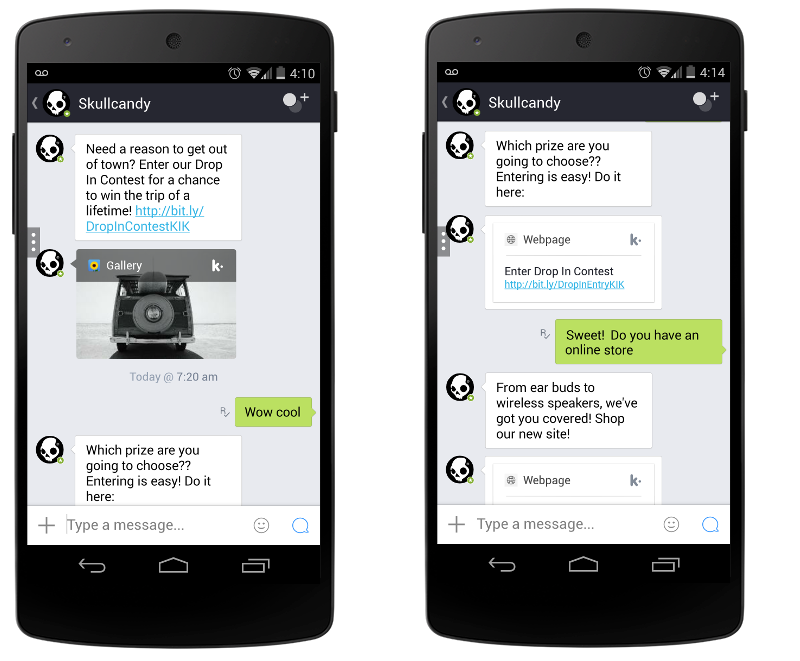Kik Gives Brands More Auto-Messaging Options With Keywords In Promoted Chats
Mobile chat apps are wildly popular, especially with the coveted younger demographic, but their primary one-to-one communication functionality puts them in a hard-to-figure category for many marketers. Waterloo, Ontario-based Kik Messenger is taking a run at this issue by giving brands the means to create individual interaction at scale. In beta testing with about 25 […]
 Mobile chat apps are wildly popular, especially with the coveted younger demographic, but their primary one-to-one communication functionality puts them in a hard-to-figure category for many marketers.
Mobile chat apps are wildly popular, especially with the coveted younger demographic, but their primary one-to-one communication functionality puts them in a hard-to-figure category for many marketers.
Waterloo, Ontario-based Kik Messenger is taking a run at this issue by giving brands the means to create individual interaction at scale. In beta testing with about 25 companies since August, Kik’s Promoted Chats offer the ability to send automated replies to Kik users.
It’s been a popular test, the company says, with 6.5 million of Kik’s 150 million users following a brand, generating more than 100 million messages. Today, Kik is rolling out an update that will give brands more personalized messaging options. The new Keyword feature offers the ability to set up a variety of words that trigger different responses.
Previously, brands were limited to one canned message at a time. Now they will be able to tailor their responses to the context of incoming messages. For example, take a look at this recent conversation with Skullcandy:
It’s not engineered for sophisticated repartee, but it appears powerful enough to provide satisfying answers to basic inquiries. Of course, this type of technology is available on enterprise customer service platforms, but none of those offer the extremely engaged Kik audience. Kik says its users, 68% of whom live in the U.S., spend an average of 97 minutes per week on the app.
When users follow one of the brand accounts — Kik is focusing first on businesses in the news, entertainment, film, TV, fashion, retail and music categories but is offering the dashboard without charge to any brand — they open a mainline to their mobile device.
“When the brand sends one of these message out, it’s a native level notification for the user,” Kik product strategist Paul Gray told Marketing Land. “The user gets a message on their phone that’s just like a text from a friend, so we have much higher read rates.”
Count NowThis among those convinced by the value of Promoted Chats and pleased by the addition of keywords. In less than 60 days of using the product, the mobile video publisher has amassed more than 200,000 Kik followers. Compare that to the 144,000 NowThis followers on Twitter.
“That’s an audience that on other platforms took us well over a year and a half or two years to get to,” Athan Stephanopoulos, NowThis senior vice president for strategy and partnerships, told Marketing Land. “Very quickly we saw that there’s a chance to reach a large audience that was highly engaged.”
NowThis built its Kik audience by promoting it aggressively on other social accounts and also paid to acquire followers using Kik’s auction-based system (“at a fraction of the cost” compared to paid follower acquisitions on other networks).
NowThis has been rewarded with reach that’s off the charts, with open rates of about 74%. Click-throughs have been “north of 10%,” and 10% of NowThis’ Kik followers talk to the company every day, so it’s no wonder that Stephanopoulos is bullish about Kik. That level of engagement just isn’t happening on other social platforms.
And with the addition of the keyword feature, NowThis can hone its Kik messaging strategy and give users a more individual experience.
“We’re incredibly, incredibly excited about the opportunity that keywords present somebody like us, a media company that creates meaningful content,” Stephanopoulos said. “Not throwing content into a feed and hoping that it hits and resonates but rather let the user drive a bit of the discovery that they are interested in.”
Contributing authors are invited to create content for MarTech and are chosen for their expertise and contribution to the martech community. Our contributors work under the oversight of the editorial staff and contributions are checked for quality and relevance to our readers. The opinions they express are their own.
Related stories
